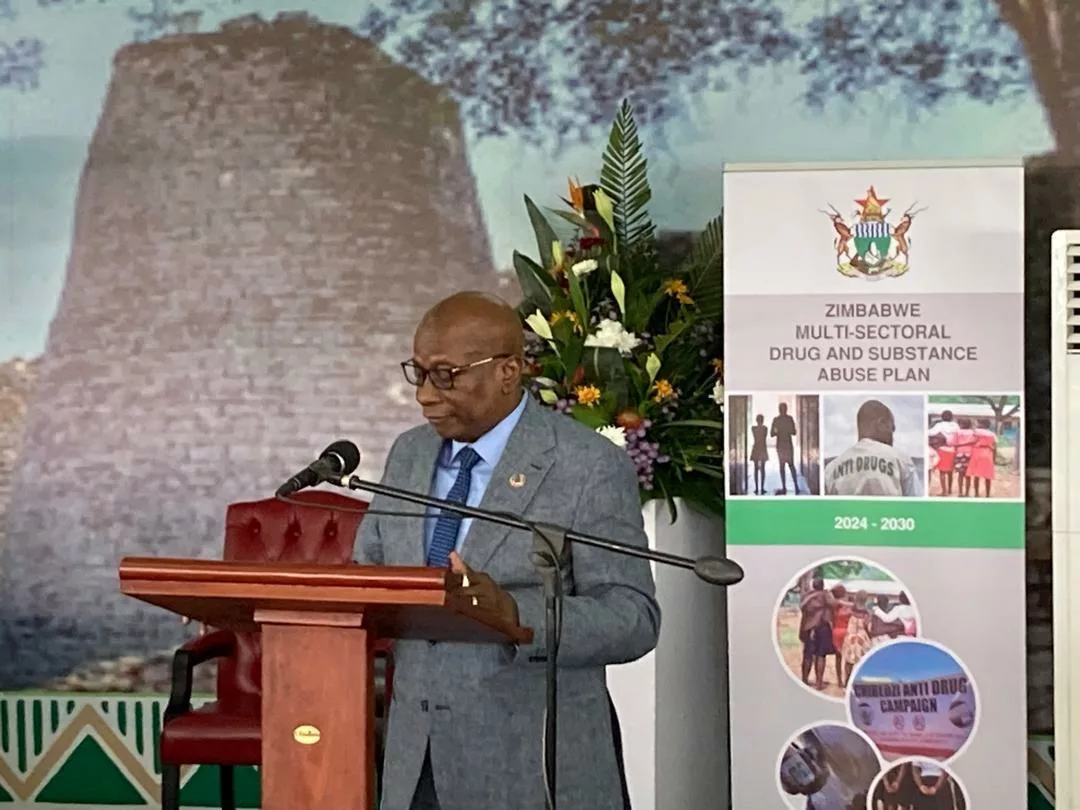|
Getting your Trinity Audio player ready...
|
The United Nations in Zimbabwe is fully behind the vision and the implementation of the action plan to end substance and drug abuse and trafficking in pursuit of attaining sustainable development, His Excellency, Mr. Edward Kallon, the UN Country Resident and Humanitarian Coordinator has said.
He made the remarks at the Launch of the National Drug and Substance Abuse today 26 June 2024, at State House in Harare at the auspicious occasion president over by President Emmerson Mnangagwa.
The event marked not only the launch of the Zimbabwe National Multi-Sectoral Drug and Substance Abuse Plan 2024-2030 but also the International Day Against Drug Abuse and Illicit Trafficking.
He said ghe launch of the comprehensive drug plan signifies the urgency of ending drug and substance abuse.
“This plan is our blueprint to eradicate this scourge from our communities, ensuring a healthier and more secure future for all Zimbabweans. This comprehensive plan is a testament to the visionary leadership of His Excellency and the unwavering determination of the people of Zimbabwe to eradicate substance abuse from their communities. We recognize the vital need to stem the flow of drugs through rigorous measures against trafficking. Dealers and traffickers must be met with unwavering resistance, and stringent laws must be enforced to curb the supply of these harmful substances.
“Central to this mission is the engagement of youth. Young people are not only the leaders of tomorrow but the vanguards of today in our relentless battle against substance abuse. We must harness their energy, ingenuity, and drive to lead awareness campaigns, educate their peers, and champion a drug-free lifestyle. By providing our youth with opportunities and resources, we fortify our future against the threat of substance abuse,” HE Kallon said.
He underscored the importance of awareness-raising activities and highlighted that knowledge is a potent weapon against ignorance and fear.
“In this regard, public awareness campaigns are indispensable. We must leverage education, media, and community outreach to shed light to the dangers of drug and substance abuse and expose the destructive operations of traffickers. Together, we will implement robust prevention programs, offer support and rehabilitation to those affected, and enforce stringent measures against traffickers who prey on the vulnerable. It is through this collective and compassionate approach that we will reclaim our communities and build a brighter, drug-free Zimbabwe.”
He said rehabilitation efforts also play a crucial role and encouraged stakeholders to offer robust support systems to those affected by substance abuse, ensuring they receive the care needed to reintegrate into society and lead productive lives.
“Rehabilitation centers, counseling services, and community support groups are critical components of this strategy. The fight against drug trafficking is a transnational issue requiring a concerted response. We must forge strong partnerships across all sectors of society, mobilizing communities behind His Excellency’s vision of a drug-free Zimbabwe.
“Collaborative efforts between government, traditional and community leaders, faith-based organizations, churches, civil society organizations, the media and influencers, and public figures and individuals are essential. Prevention must be our foremost strategy, grounded in science, research, compassion, and respect for human rights. As the theme of World Drug Day 2024 aptly states, “The evidence is clear: invest in prevention.” We must understand the social, economic, and health repercussions of drug use to craft effective policies and interventions.”
According to the United Nations Office on Drugs and Crime (UNODC) 2024 World Drug Report, almost 292 million, or 1 in 18, people used a drug in 2022, a rise of 20% from a decade earlier. Globally, substance abuse is a leading cause of crime and contributes to poverty, dysfunctional families and communities, the burden of disease, injury, and premature death.
Public health concerns are growing in Africa, where drug markets are rapidly diversifying from large markets of domestically sourced cannabis to those now including a multitude of transiting drugs such as cocaine and heroin, in addition to illicitly manufactured pharmaceuticals and new domestic harmful combinations with unclear content.
The trafficking of these drugs to and from Africa has clearly increased over the last three decades. This has resulted in a spillover of international drug trafficking flows to local markets, exacerbating drug use harms. Therefore, the devastating consequences of substance abuse have the potential to undermine the gains which our new dispensation has made possible.
Zimbabwe adopted the National Drug Master Plan and Treatment and Rehabilitation guidelines for alcohol and substance use disorders in 2021.
An Inter-Ministerial Committee on Drug Abuse, chaired by Honourable Oppah Muchinguri-Kashiri, Minister of Defence, was established, further expanding the master plan into the Zimbabwe Multisectoral Drug and Substance Abuse Plan launched today.
The plan, with full support of the UN Development System in Zimbabwe and technical agencies such as UNICEF, UNODC, WHO and others, will increase the visibility of evidence that many interventions have been implemented in Zimbabwe.
According to the evidence available, 60% of patients admitted to mental health facilities in Zimbabwe are affected by substance use disorders. With a projected 40% increase in drug consumption among the youth across Africa between 2018 and 2030, the theme of the Anti-Drug Day for this year is particularly resounding.
Given that drug trafficking is a transnational issue requiring a coordinated response from governments, organizations, and individuals, HE Kallon urged stakeholders to continue to forge effective partnerships.






